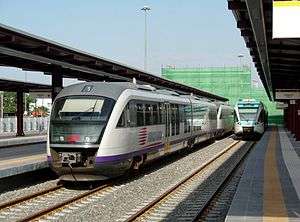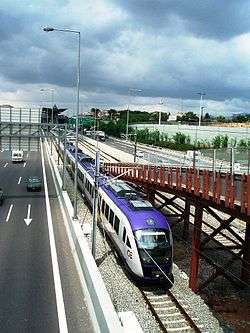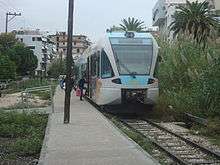Proastiakos
 | |
 | |
| Overview | |
|---|---|
| Locale |
|
| Transit type | Commuter rail, Urban rail |
| Number of lines | 5 |
| Number of stations | 79 |
| Website | TrainOSE (operator) |
| Operation | |
| Began operation | 2004 |
| Operator(s) | TrainOSE |
| Technical | |
| System length |
|
| Track gauge |
|
| Electrification | 25k V DC overhead lines |
| Top speed | 160 km/h (99 mph) |
The Proastiakos (Greek: Προαστιακός, English: 'suburban') is the collective name for Greece's suburban (commuter rail) services, which are run by TrainOSE, the country's only rail operator, on infrastructure owned by the Hellenic Railways Organisation (OSE).
As of March 2016 there are three Proastiakos networks, servicing the country's three largest cities: Athens, Thessaloniki and Patras, providing them with commuter rail links towards their suburbs and also with regional services to other cities and towns.
In Athens, the Proastiakos offers a direct connection between Athens International Airport and Kiato, in the Peloponnese. The service also connects the port of Piraeus with Halkida in Evia, through Athens Railway Station, which is more commonly called Stathmos Larisis.
In Thessaloniki, there are two Proastiakos services. The first connects the city's New Railway Station with the city of Larissa and the second links the city with Edessa.
In July 2010 a new commuter rail service was launched in Patras, connecting the city with Rio.
Photography and video-taking is permitted across the whole Proastiakos network, however very often the security personnel might create problems to photographers.[1]
Etymology
The term Proastiakos, which translates as "suburban", is derived from the ancient Greek word "proasteion" (suburb, προάστειον), "pro + asty (προ-άστυ)" meaning "before the city". However the same brand name has also been used for some regional rail services.
History
The concept of a regular and frequent suburban and commuter rail services was introduced in Greece in the 1990s. It became possible due to extra capacity becoming available through improvements to the existing lines and the construction of new ones. In the past suburban services ran on very infrequent timetables and were not very popular.
The construction of a new rail line between central Athens, its eastern suburbs and the new Athens International Airport was decided in 1992-1993. During the construction of Attiki Odos motorway in the late 1990s, space was left between the main carriageways for the railway line and after two years of construction, the line to Athens International Airport opened in 2004. The first suburban services between Athens and the Airport were inaugurated using Stadler GTW and Siemens Desiro DMU trains.
On the 27th of September 2005, the new standard gauge rail line reached Corinth, terminating at a new station, located at Examilia. This line today is served by "Proastiakos" suburban services, while initially "Proastiakos" trains stopped at Nea Peramos, Megara, Kinetta and Agioi Theodoroi. On 18 July 2006 three new stations were added: Ano Liosia, Aspropyrgos and Magoula. On 4 June 2007 the line was extended from Athens to the port of Piraeus with 3 intermediate stations at Lefka, Rentis and Rouf. This extension linked the airport with the port of Piraeus. On the 9th of July 2007, Proastiakos services reached the new station at Kiato.
TrainOSE also runs "Proastiakos" commuter rail services between the cities of Thessaloniki and Larissa, on the modernised and electrified main line. The service initially operated from Thessaloniki to Litochoro in 2007 and was extended to Larissa in 2008.
In 2009 the brand name "Proastiakos" was also used for a short-lived regional service of four trains in each direction per day, connecting the cities of Xanthi, Komotini and Alexandroupolis in the region of Western Thrace.
Proastiakos Athens


Proastiakos of Athens consists of two routes: one from Piraeus to Chalcis with a branch to Ano Liosia and one route from Kiato to the Airport. Trains run from approximately 5:00am to midnight daily.[2][3] There are 44 stations in total.
The following table lists the routes and the stations for the Proastiakos network of Athens (correct to 20 April 2014):
| Route | Prefix | Map color[4] | Route | Stations |
|---|---|---|---|---|
| 1 | 15, 25, 35, 45[5] | Blue | Piraeus – Chalcis | 24 |
| 2 | 42[6] | Gold | Athens Airport–Kiato railway | 21 |
| 3 | 43[7] | Indigo | Athens – Ano Liosia | 5 |
Connections
The suburban railway connects with the other urban railways of Athens in the following stations:
- Piraeus: The suburban station is located close to the Metro Line 1 terminus.
- Athens Central (Larissa Station): connection with Metro line 2.
- Nerantziotissa: Connection with Metro Line 1.
- Plakentias: connection with Metro line 3.
- Pallini: shared station with Metro line 3.
- Paiania–Kantza: shared station with Metro line 3.
- Koropi: shared station with Metro line 3.
- Airport: shared station with Metro line 3.
Proastiakos Thessaloniki
Proastiakos of Thessaloniki consists of two routes: one from Thessaloniki to Larissa and one from Thessaloniki to Edessa. Trains run from approximately 5:00am to midnight daily.[2][3]
The following table lists the routes and the stations for the Proastiakos network of Thessaloniki, Larissa and Florina is:
| Route | Elec. | First section opened | Latest section opened | Latest station opened | Route | Length (km, mi) | Stations |
|---|---|---|---|---|---|---|---|
| Pieria Line | 2007 | 7 September 2007 | 7 September 2008 | 7 September 2008 (Larissa) | Larissa – Thessaloniki | 165.2 km (103 mi.) | 12 |
| Imathia-Pella Line | 25 January 2008 | 10 August 2013 | 10 August 2013 (Florina) | Thessaloniki - Florina | 156.4 km (71.3 mi.) | 22 |
Connections
The Proastiakos service towards Kiato also connects to the following long distance and regional rail services:
- Acharnai (SKA): passengers can transfer to the mainline and regional rail service of Greece.
- Kiato: passengers can transfer to TrainOSE bus services or to the metre gauge rail service to Patras.
The Proastiakos service towards Larissa also connects to the following long distance and regional rail services:
- Thessaloniki: future connection to Thessaloniki Metro
- Platy: passengers can transfer to the regional rail service of Western Macedonia (towards Verroia, Edessa, Amyntaio, Florina and Kozani).
- Larissa: passengers can transfer to the mainline and regional rail service.
Proastiakos Patras

Proastiakos of Patras consists of just one route from Agios Andreas station to the western suburb of Agios Vasileios with a bus service from Kastellokampos to the Patras University Hospital and the University of Patras campus.[8] Trains run daily from 6:23 in the morning until 23:23 in the evening.[8]
The following table lists the routes and the stations for the Proastiakos line of Patras is:
| Route | First section opened | Latest section opened | Latest station opened | Route | Length (km, mi) | Stations |
|---|---|---|---|---|---|---|
| A | 9 July 2010 | Agios Andreas – Agios Vasileios | 12.5 km (7.8 mi.) | 8 |
Rolling stock
Proastiakos uses rolling stock owned and maintained by OSE S.A. Currently multiple units are used almost exclusively. Siemens Desiro 5-car electric multiple units (EMU) are used for Ano Liosia-Airport, Airport-Kiato and Thessaloniki-Larisa services, while Stadler GTW-2/6 and MAN-2000 diesel two-car multiple units (DMU-2) are used for the Piraeus-Ano Liosia and Patras-Rio services. As these DMUs have limited passenger carrying capacity, two or three DMUs are coupled together, when rolling stock availability allows it.
Fares
Standard tickets (€1,40), valid on all urban buses and trains, are also valid on Proastiakos trains between Piraeus, SKA, Koropi and Magoula. Higher fares apply for travel to the Airport, between Magoula and Kiato; and between Thessaloniki and Larisa. A one-way ticket from Piraeus or Athens to the Airport costs €10 and a return ticket €18.
Tickets must be validated on special ticket validation machines on the platform, before boarding the train. Return tickets must be re-validated before boarding a return train. There are no ticket validation machines on the trains.
Future plans
Addition of new routes and stations to Proastiakos services depends on the progress of a number of OSE infrastructure projects in Attica. The most important projects are:
- Construction of a three or four track line between Rouf and SKA stations.
- Electrification of lines between Piraeus and SKA.
- Installation of signalling on lines between Piraeus and SKA.
- Construction of ten passenger platforms and one "through track" at Athens Central station.
- Construction of new stations at Tavros, Pyrgos Vasilissis, Lykotrypa and Zevgolatio.
As of April 2011, introduction of new and more frequent services is mainly hindered by limited line capacity between Rouf and SKA; and limited availability of diesel rolling stock for the non-electrified line.
Section: Piraeus – S.K.A.
A number of new stations and halts are under construction on this line and they shall be served by Proastiakos trains:
- Tavros
- Athens (Athens Central Railway Station): The station is extended with new platforms to serve future suburban services.
- Agioi Anargyroi: New four platform station served by mainline and suburban trains, plus a freight siding. The fast line platforms are already operational and are served by Proastiakos and Athens-Chalkis trains. The slow lines are under construction.
- Pyrgos Vasilissis: Shall open after the slow lines between Agioi Anargyroi and SKA are operational.
- Lykotrypa: Shall open after the slow lines between Agioi Anargyroi and SKA are operational.
- Acharnai Railway Center (SKA): The station is partly open since 2011-04-05, extensive work is still required to finish the first phase of the complex.
Section: SKA – Koropi - Lavrio
The extension to Lavrio will mostly follow the alignment of the old Athens to Lavrio metric gauge line, which closed to passengers in 1957 and to goods in 1962. Most of the old alignment is still intact, and several bridges, all station buildings as well as the tracks themselves on many locations, are still in situ, but will need to be replaced as they were designed for a single metric gauge line, while the new one will be standard gauge and double-track for most of its length. The new line will branch off the airport line just beyond Koropi station. New stations will be built at
- Markopoulo
- Kalyvia
- Kouvaras
- Keratea
- Amphitrope
- Thoriko
- Lavrio
- Port of Lavrio
at or near the same site as their predecessors, the buildings of which, most of them listed structures, will hopefully be preserved. The line will be electrified from the outset.
Section: SKA – Pallini - Rafina
Future services to Rafina will be on new lines, currently under consideration. The line to Rafina shall branch off after Pallini station and will partly run on the central reservation of the Hymittus Ring Road. The stations will be:
- Pikermi
- Kallitechnoupoli
- Rafina
Section: SKA – Corinth / Kiato / Xylokastro / Loutraki
The existing line to Kiato is being extended to Xylokastro, which shall be the final destination of suburban trains. A branch line to Loutraki is under consideration but is delayed due to reactions by the local authority.
- Zefyri: A new station planned to serve a future sports center, if built in the area.
- Xylokastro: Extension to Xylokastro is under construction.
- Loutraki branch (under consideration):
See also
References
- ↑ "synigoros.gr" (PDF).
- 1 2 "Urban Rail Transport S.A.: First & Last Train Departures". Urban Rail Transport S.A. (STASY). Retrieved 2013-07-25.
- 1 2 "Urban Rail Transport S.A.: Detailed TRAM Timetables". Urban Rail Transport S.A. (STASY). Retrieved 2013-07-25.
- ↑ "Untitled (Proastiakos Map)" (PDF). TrainOSE. 28 July 2012. Retrieved 25 April 2014.
- ↑ "Timetable: Piraeus–Chalkida" (PDF). TrainOSE. 14 April 2014. Retrieved 20 April 2014. Services with train numbers starting with 35 and 45 run only up to two times a day, for each direction.
- ↑ "Timetable: Kiato–Airport" (PDF). TrainOSE. 27 February 2014. Retrieved 20 April 2014.
- ↑ "Timetable: Athens–Ano Liosia" (PDF). TrainOSE. 2 April 2014. Retrieved 20 April 2014.
- 1 2 "Patras Suburban Railway". trainose.gr. Retrieved 12 February 2015.
Further reading
- G. Nathenas; A. Kourbelis; T. Vlastos; S. Kourouzidis; V. Katsareas; P. Karamanis; A. Klonos; N. Kokkinos (2007). Από τα Παμφορεία στο Μετρό (in Greek). 2. Athens: Μίλητος (Militos). ISBN 978-960-8460-91-1.
External links
| Wikimedia Commons has media related to Greek Suburban Railway. |
